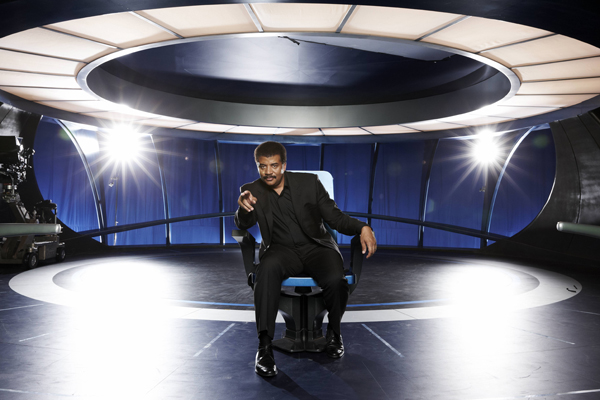 For all the hype about “Cosmos” (Fox, 9 p.m.) and the fact that it’s breaking new ground for a new millennium, updating the Carl Sagan classic in a manner so big they can barely contain themselves, these people must have not been watching Discovery for years.
For all the hype about “Cosmos” (Fox, 9 p.m.) and the fact that it’s breaking new ground for a new millennium, updating the Carl Sagan classic in a manner so big they can barely contain themselves, these people must have not been watching Discovery for years.
Ambitious series about the universe, in which we live like particles of dust and TV consumers, have been a staple on cable ever since “Planet Earth” became the best way to show off widescreen HD sets. What’s groundbreaking perhaps is that no commercial network has jumped into the astrology documentary world with quite the commitment of Fox.
And while it would seem an odd choice for a network that had been bent from its start on shaking things up, to be presenting what would be considered standard classroom film fare, it’s the timing of the series and the insistence of its science that make it such a bold turn.
At a time when a third of the population doesn’t believe in evolution, when people are lining up at creationist museums and increasingly the entire scientific process is just seen as a theory or belief system to reject or accept at will, the need to bolster provable science is palpable.
Neil deGrasse Tyson who takes Sagan’s place here begins the series with his mentor’s words that sound more like a relgious tract than anything else: “The cosmos is all that is or was or ever will be.”
It’s up to Tyson to present its mind-boggling vastness and quirks. And yet by jumping aboard a cheesy Ship of the Imagintion to do the exploring, he immediately places the series into the more fictional half of science fiction. Since the spacecraft is fake, isn’t everything else up for question too?
“Question everything,” Tyson says, in explaining scientific process. And yet those words merely bolster those who’d want to say they still think the Earth is flat.
If “Cosmos” is here for 13 episodes on 10 networks to bolster science, it should do so with annotated evidence, other scientists and actual photography rather than Tyson’s proclamations, special effects and animation. The music especially, while meant to suggest the grandeur of the galaxy, merely recalls corny old sci-fi movies. You half expect E.T. to be petalled past, waving his light-up finger, or Superman giving a wave.
Seth MacFarlane, a fan of the original “Cosmos” when he was a kid, gets credit for helping revive the franchise and deserves thanks for mostly staying out of the process. There is no Stewie cameo (at least in episode one), no fart jokes and the animation used is as far away as possible from the “Family Guy” it is pre-empting.
There have been a lot of advances in filmmaking and space exploration since the original “Cosmos” nearly 35 years ago — the new version would be wise to stick to the latest and quite fascinating photography from outer space probes rather than cooking up their own. Keep it entirely real, quote scientists and cite studies. Carbon date your rocks; prove to people the world’s been around billions, not thousands of year. Show the difference between fact and theory.
It’s the only way you’re going to get people off the Medieval idea that man came first in a world where U.S. science proficiency is dropping and science itself is increasingly dismissed as mere theory.